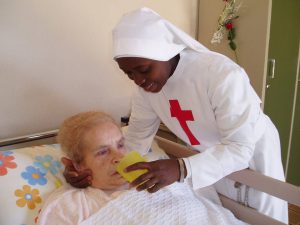 The Christian community is the historical extension of Christ. The sick person should find in it the privileged place that they found in Jesus; the same preference, closeness and welcome, the same respectful and tender treatment, his healing strength.
The Christian community is the historical extension of Christ. The sick person should find in it the privileged place that they found in Jesus; the same preference, closeness and welcome, the same respectful and tender treatment, his healing strength.
The suffering person is a responsible and active participant in the work of evangelization and salvation and this involves the Christian community in a health ministry that is built around the sick person as protagonist and evangelizer.
The family occupies the primary place in the humanization of the person and of society. They are called to be a community of health, to educate in living a healthy lifestyle, to promote health among its members and its environment. It is important to recover the family as an essential collaborator in the care for and accompaniment of the sick members of the community.
The parish community takes on human promotion, the care for and preservation of health, pastoral accompaniment of the sick and the elderly in fidelity to its mission of building the Kingdom of God. A collaborative pastoral ministry will take into account the parish and diocesan plan for ministry.
Following the example of the first Christian communities, the basic ecclesial communities will show a special care for the weakest and those most in need, fulfilling the evangelizing and prophetic mission of announcing a more just, community-based, and fraternal life and to speak against injustices and situations of social sin.
All religious men and women, but in a special way those that profess the charism of Jesus Good Samaritan, are called to be a testimony of faith and hope in a world that is increasingly dehumanized, technocentric and materialistic, and to enrich with their presence the ecclesial community in a spirit of openness and collaboration with the parish activities, as well as to encourage and accompany health ministry groups.
Health ministry groups express the vitality and gospel spirit of the People of God; they make present in the Christian community the love and special care of Jesus for the weakest and sickest among us.
International, national and local organizations are places where health care policy decisions are made. It is necessary to participate actively and critically in them in order to illuminate the actions of the world of health care with the Gospel, and to work in favor of the poorest and least protected among us.
The institutions of the world of health care: hospitals, clinics, dispensaries, universities, etc., are called to educate about and promote health, to care for and defend life, from conception until natural death, to offer comprehensive and human care to sick people and their families, recognizing and respecting their rights.
The Catholic hospitals and clinics should keep in mind:
- The institution is a privileged place for evangelization.
- The health personnel should distinguish themselves by their solid human and social formation.
- In hospital management, human and spiritual aspects must take priority to financial and administrative aspects.
- When there are partnerships with public health institutions, “ensure that conscientious objection is recognized in legislation, and monitor to ensure that it is respected by governments.”
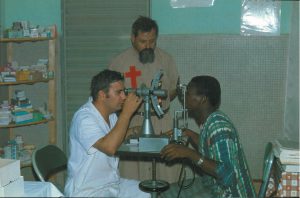 Health workers are natural agents of health ministry; it is important to act together with them, accompanying them in their process of formation, of humanization and strengthening of human, ethical and bioethical values.
Health workers are natural agents of health ministry; it is important to act together with them, accompanying them in their process of formation, of humanization and strengthening of human, ethical and bioethical values.
Humanization leads us to affirm that “being” with the sick person can be more important than “doing”. Meeting with the other means listening to them, welcoming them with their preoccupations, hopes, difficulties, with their personal history, their fears, their anguish; establish a relationship of peers with them, centered on the person, reaffirming their dignity and greatness. It means not glossing over situations that the sick person and their family are experiencing; offering a comprehensive assistance that satisfies their needs on a physical, emotional, intellectual, social and spiritual level, and not just solving their specific pathology.
Humanization has to do with a personal attitude, a lifestyle that goes beyond norms, ideology or a philosophy; it is moving from a functional relationship to an empathic one, centered on the person.
“No institution can by itself replace the human heart, human compassion, human love or human initiative, when it is a question of dealing with the sufferings of another.” (Salvifici Doloris 29)
“While professional competence is a primary, fundamental requirement, it is not of itself sufficient. We are dealing with human beings, and human beings always need something more than technically proper care. They need humanity. They need heartfelt concern… Consequently, in addition to their necessary professional training, these charity workers need a ‘formation of the heart’.” (Deus caritas est 31a)
Pastoral and spiritual care will be carried out by a team guided by the priest, deacon, religious brother or sister, or a layperson trained in this specific area. The team will be in relationship with the other groups in the institution, with the parish agents of health ministry and with those from other religious beliefs.
It will be a significant presence that gathers together all the Christian strengths present in the institution and will make possible the missionary and healing action of the Christian community on behalf of the sick and their relatives that assist them, respecting their beliefs and faith.
“Love is free; it is not practiced as a way of achieving other ends… Those who practice charity in the Church’s name will never seek to impose the Church’s faith upon others. They realize that a pure and generous love is the best witness to the God in whom we believe and by whom we are driven to love. A Christian knows when it is time to speak of God and when it is better to say nothing and to let love alone speak. He knows that God is love (cf. 1 Jn 4:8) and that God’s presence is felt at the very time when the only thing we do is to love.” (Deus caritas est 31c)
The educational institutions actively participate in the growth and integral formation of the individuals; thus the importance of the fact that in their plans and programs they include what is related to promotion, prevention, education and humanization in health care.
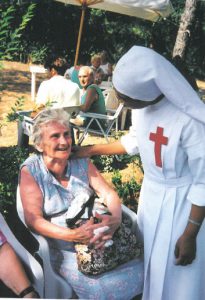 Volunteer service is a concrete expression of the love of God; it is the duty of every person, and especially of the Christian. With their attitude of love and free and unconditional service, volunteers promote the culture of life, based on the values of solidarity and fraternity.
Volunteer service is a concrete expression of the love of God; it is the duty of every person, and especially of the Christian. With their attitude of love and free and unconditional service, volunteers promote the culture of life, based on the values of solidarity and fraternity.
Many groups and associations of sick people organize to mutually support one another. It is important to value, recognize and accompany their efforts; they communicate and convey great human and Christian values to the community.
The popular (mass movement) organizations are instances of the resistance of a people that organizes in order to survive when faced with growing impoverishment; it is necessary to recognize and support the efforts that are being carried out in service of the community, training them in the promotion of health and prevention of sicknesses.
“The new movements and communities are a gift of the Holy Spirit to the Church. In them the faithful find the opportunity to be formed as Christians, growing, and committing themselves apostolically as true missionary disciples… By their very nature they express the charismatic dimension of the church; in the modern world, we must respond to the new situations and needs of Christian life.” (Aparecida 311-12)
In the seminaries and houses of formation of the religious, it is important to keep in mind the formation plans of the future pastors, and offer training and formation in health ministry that illuminates and molds the heart for the exercise of charity.
Media play an ever more important role as institutions of information and communication; thus, it is good to take advantage of and carry out education programs and campaigns in defense of life and promoting health.



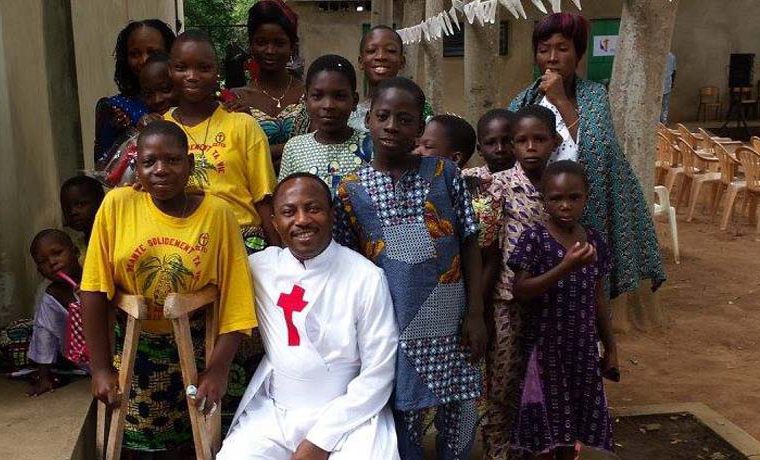


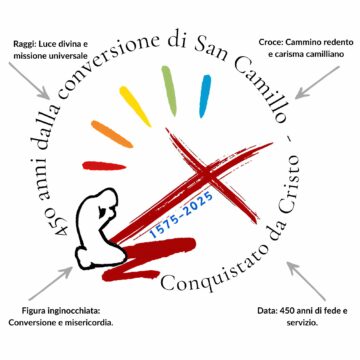


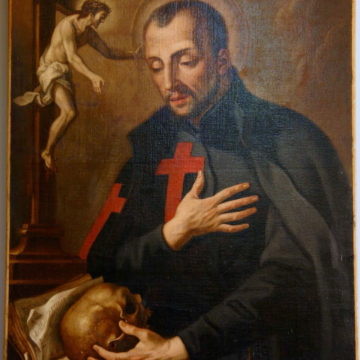


Camillians on Facebook
Camillians on Twitter
Camillians on Instagram